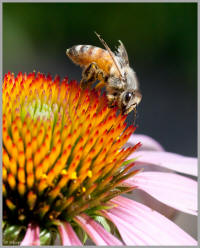
Aerial spraying for mosquito control over Sacramento
|
As some additional background, a beekeeper intending on a more
self-sustained colony will not harvest all the honey from the hive at the
end of the season, but leave some for the colony to last through the
winter. Some of the more industrialized beekeepers tend to be more harsh
about their treatment of the bees, including dumping the entire colony to
get all the honey, and then "re-queening" in the spring to start anew, using
sugar water and protein paddies to feed the new bees until they have
established a sufficient reserve of honey of their own. Many times this
queen is imported from elsewhere, which creates the disadvantage of trying
to establish bees that may not be as genetically acclimated to the
environment or have the same immunity to the local hazards such as some
types of fungus, mites, or other parasites. These elements are suspected and
blamed by some as the source for Colony Collapse Disorder (CCD). In my opinion I
think the problem is more complex and likely more induced by man by such
industrial practices just described that tend to undermine the bees immunity
and robustness to their local habitat. A healthy stronger bee is likely to
better handle the adversity around it. More prolific and advanced
pesticides, many of which the side effects are still not fully understood or
disclosed to the general public are likely another culprit for the failure
of bee colonies. It is convenient to label such problems with such a
monolithic cause as CCD, but perhaps that just tends to create a scapegoat
in the form of an unknown mystery, diverting the public’s eye from the more
fundamental causes.
 Organic farms tend to rely much more heavily on the
value of beneficial insects and how to balance them to use to their
advantage as an alternative to pesticides. When you consider the advantages
from the health standpoint (i.e. not ingesting pesticides) and lower cost of
trying to harmonize your garden with the insect world around you, it is then
that you realize the negative consequences of going to pesticides as a
gardening or farming solution. Monolithic crops and lack of rotation tend to
aggravate the insect issue in the negative direction, while diversity tends
to give harmful insects and other predators less of an established foothold
to build on and multiply, while at the same time encouraging more beneficial
insects to keep the bad ones in check (i.e. ladybugs versus aphids). Some
in the organic gardening community have the cynical belief that these
pesticide companies view beneficial insects as both their competition and
source of business. "Win-win" in business speak comes to mind on their
motivation for eradication. If you wish to support the good cause and vote
with your wallet, then try buying more organically grown food.
Organic farms tend to rely much more heavily on the
value of beneficial insects and how to balance them to use to their
advantage as an alternative to pesticides. When you consider the advantages
from the health standpoint (i.e. not ingesting pesticides) and lower cost of
trying to harmonize your garden with the insect world around you, it is then
that you realize the negative consequences of going to pesticides as a
gardening or farming solution. Monolithic crops and lack of rotation tend to
aggravate the insect issue in the negative direction, while diversity tends
to give harmful insects and other predators less of an established foothold
to build on and multiply, while at the same time encouraging more beneficial
insects to keep the bad ones in check (i.e. ladybugs versus aphids). Some
in the organic gardening community have the cynical belief that these
pesticide companies view beneficial insects as both their competition and
source of business. "Win-win" in business speak comes to mind on their
motivation for eradication. If you wish to support the good cause and vote
with your wallet, then try buying more organically grown food.
Organic farms tend to rely much more heavily on the
value of beneficial insects and how to balance them to use to their
advantage as an alternative to pesticides. When you consider the advantages
from the health standpoint (i.e. not ingesting pesticides) and lower cost of
trying to harmonize your garden with the insect world around you, it is then
that you realize the negative consequences of going to pesticides as a
gardening or farming solution. Monolithic crops and lack of rotation tend to
aggravate the insect issue in the negative direction, while diversity tends
to give harmful insects and other predators less of an established foothold
to build on and multiply, while at the same time encouraging more beneficial
insects to keep the bad ones in check (i.e. ladybugs versus aphids). Some
in the organic gardening community have the cynical belief that these
pesticide companies view beneficial insects as both their competition and
source of business. "Win-win" in business speak comes to mind on their
motivation for eradication. If you wish to support the good cause and vote
with your wallet, then try buying more organically grown food.